Service Quality and Customer Satisfaction: A Study of Sydney Hotels
VerifiedAdded on 2023/06/13
|10
|2679
|144
Literature Review
AI Summary
This literature review examines the impact of service quality on customer satisfaction within the hotel sector, focusing on a case study of hotels in Sydney, Australia. It highlights the significance of tourism to Australia's GDP and the increasing competition within the hospitality industry. The review delves into factors influencing customer satisfaction, explores primary models for measuring service quality such as SERVQUAL and SERVPERF, and analyzes the relationship between service quality dimensions (tangibles, empathy, assurance, reliability, responsiveness) and customer satisfaction based on various studies. The research identifies knowledge gaps in existing literature, particularly concerning Sydney hotels, and aims to address these gaps by investigating the factors influencing customer satisfaction and assessing the relationship between service quality and customer satisfaction in Sydney's hotel industry.
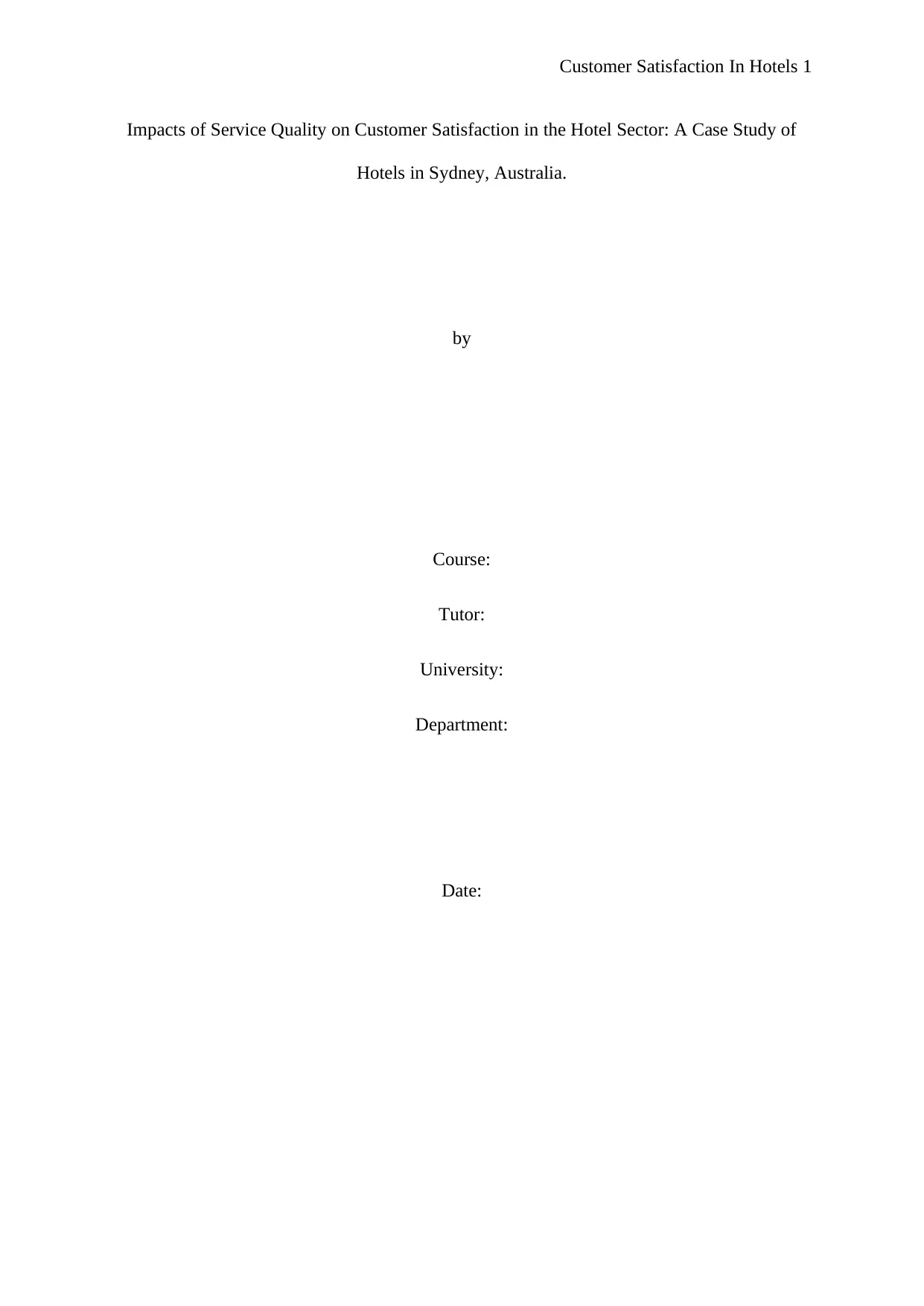
Customer Satisfaction In Hotels 1
Impacts of Service Quality on Customer Satisfaction in the Hotel Sector: A Case Study of
Hotels in Sydney, Australia.
by
Course:
Tutor:
University:
Department:
Date:
Impacts of Service Quality on Customer Satisfaction in the Hotel Sector: A Case Study of
Hotels in Sydney, Australia.
by
Course:
Tutor:
University:
Department:
Date:
Paraphrase This Document
Need a fresh take? Get an instant paraphrase of this document with our AI Paraphraser
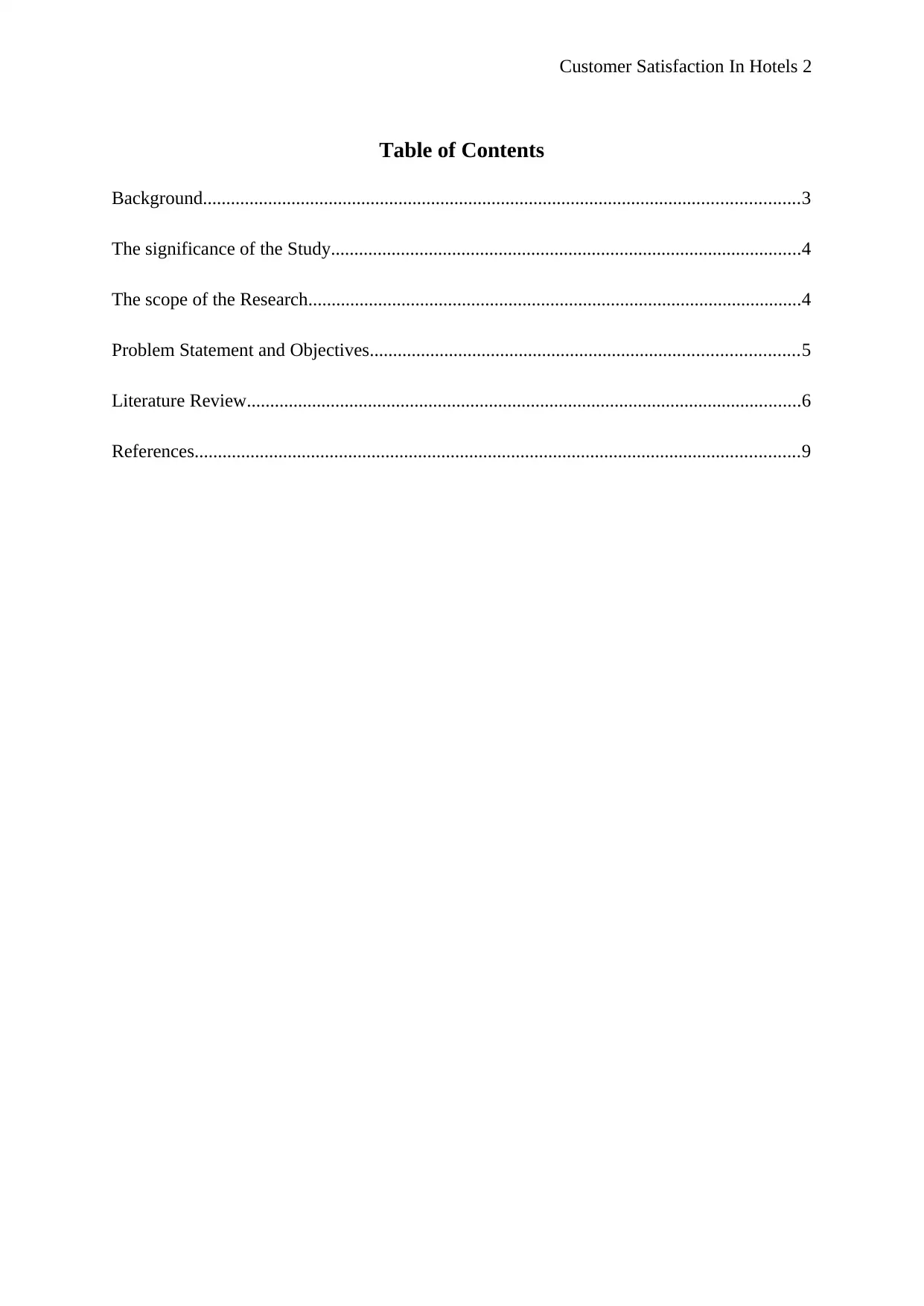
Customer Satisfaction In Hotels 2
Table of Contents
Background................................................................................................................................3
The significance of the Study.....................................................................................................4
The scope of the Research..........................................................................................................4
Problem Statement and Objectives............................................................................................5
Literature Review.......................................................................................................................6
References..................................................................................................................................9
Table of Contents
Background................................................................................................................................3
The significance of the Study.....................................................................................................4
The scope of the Research..........................................................................................................4
Problem Statement and Objectives............................................................................................5
Literature Review.......................................................................................................................6
References..................................................................................................................................9
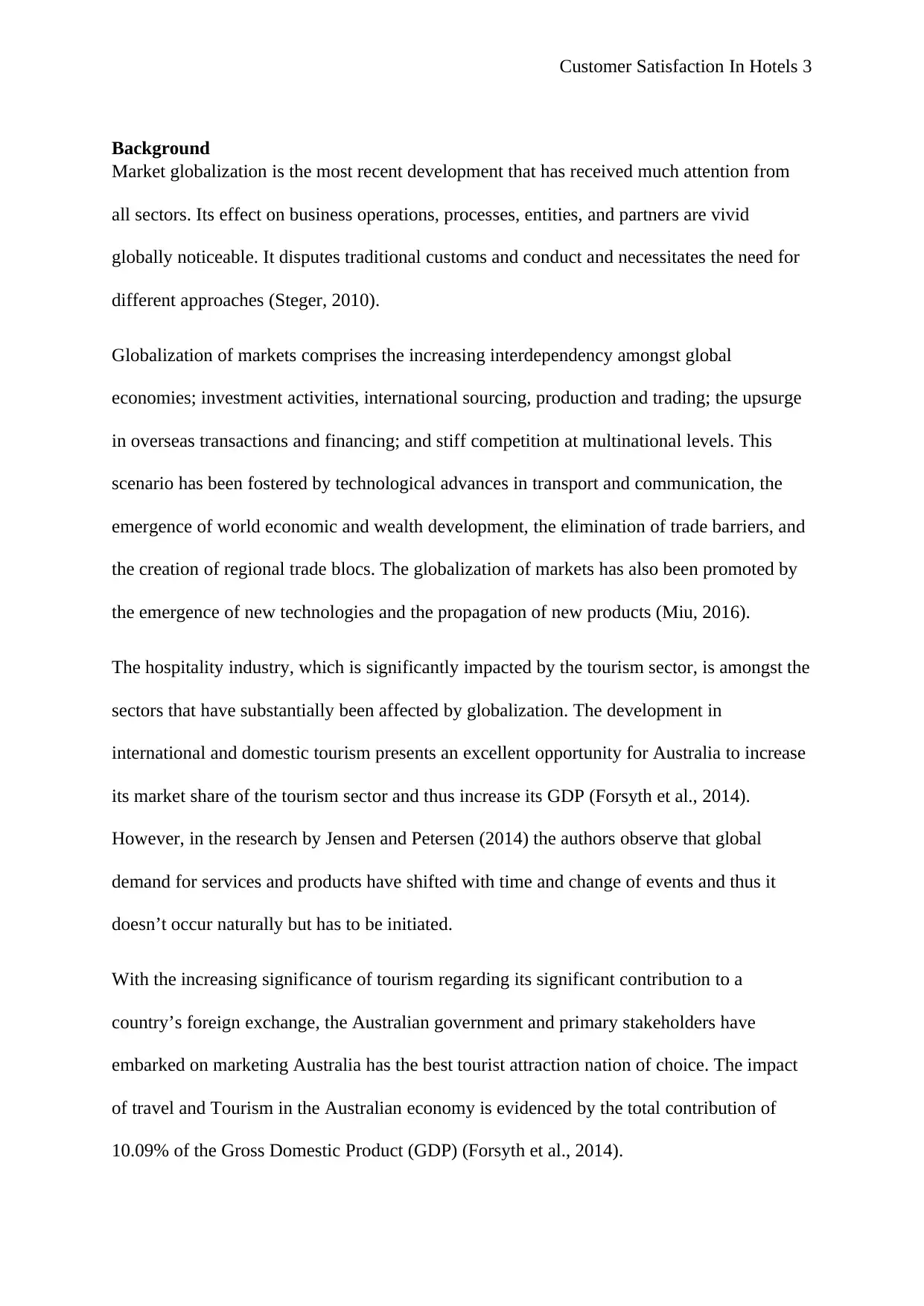
Customer Satisfaction In Hotels 3
Background
Market globalization is the most recent development that has received much attention from
all sectors. Its effect on business operations, processes, entities, and partners are vivid
globally noticeable. It disputes traditional customs and conduct and necessitates the need for
different approaches (Steger, 2010).
Globalization of markets comprises the increasing interdependency amongst global
economies; investment activities, international sourcing, production and trading; the upsurge
in overseas transactions and financing; and stiff competition at multinational levels. This
scenario has been fostered by technological advances in transport and communication, the
emergence of world economic and wealth development, the elimination of trade barriers, and
the creation of regional trade blocs. The globalization of markets has also been promoted by
the emergence of new technologies and the propagation of new products (Miu, 2016).
The hospitality industry, which is significantly impacted by the tourism sector, is amongst the
sectors that have substantially been affected by globalization. The development in
international and domestic tourism presents an excellent opportunity for Australia to increase
its market share of the tourism sector and thus increase its GDP (Forsyth et al., 2014).
However, in the research by Jensen and Petersen (2014) the authors observe that global
demand for services and products have shifted with time and change of events and thus it
doesn’t occur naturally but has to be initiated.
With the increasing significance of tourism regarding its significant contribution to a
country’s foreign exchange, the Australian government and primary stakeholders have
embarked on marketing Australia has the best tourist attraction nation of choice. The impact
of travel and Tourism in the Australian economy is evidenced by the total contribution of
10.09% of the Gross Domestic Product (GDP) (Forsyth et al., 2014).
Background
Market globalization is the most recent development that has received much attention from
all sectors. Its effect on business operations, processes, entities, and partners are vivid
globally noticeable. It disputes traditional customs and conduct and necessitates the need for
different approaches (Steger, 2010).
Globalization of markets comprises the increasing interdependency amongst global
economies; investment activities, international sourcing, production and trading; the upsurge
in overseas transactions and financing; and stiff competition at multinational levels. This
scenario has been fostered by technological advances in transport and communication, the
emergence of world economic and wealth development, the elimination of trade barriers, and
the creation of regional trade blocs. The globalization of markets has also been promoted by
the emergence of new technologies and the propagation of new products (Miu, 2016).
The hospitality industry, which is significantly impacted by the tourism sector, is amongst the
sectors that have substantially been affected by globalization. The development in
international and domestic tourism presents an excellent opportunity for Australia to increase
its market share of the tourism sector and thus increase its GDP (Forsyth et al., 2014).
However, in the research by Jensen and Petersen (2014) the authors observe that global
demand for services and products have shifted with time and change of events and thus it
doesn’t occur naturally but has to be initiated.
With the increasing significance of tourism regarding its significant contribution to a
country’s foreign exchange, the Australian government and primary stakeholders have
embarked on marketing Australia has the best tourist attraction nation of choice. The impact
of travel and Tourism in the Australian economy is evidenced by the total contribution of
10.09% of the Gross Domestic Product (GDP) (Forsyth et al., 2014).
⊘ This is a preview!⊘
Do you want full access?
Subscribe today to unlock all pages.

Trusted by 1+ million students worldwide
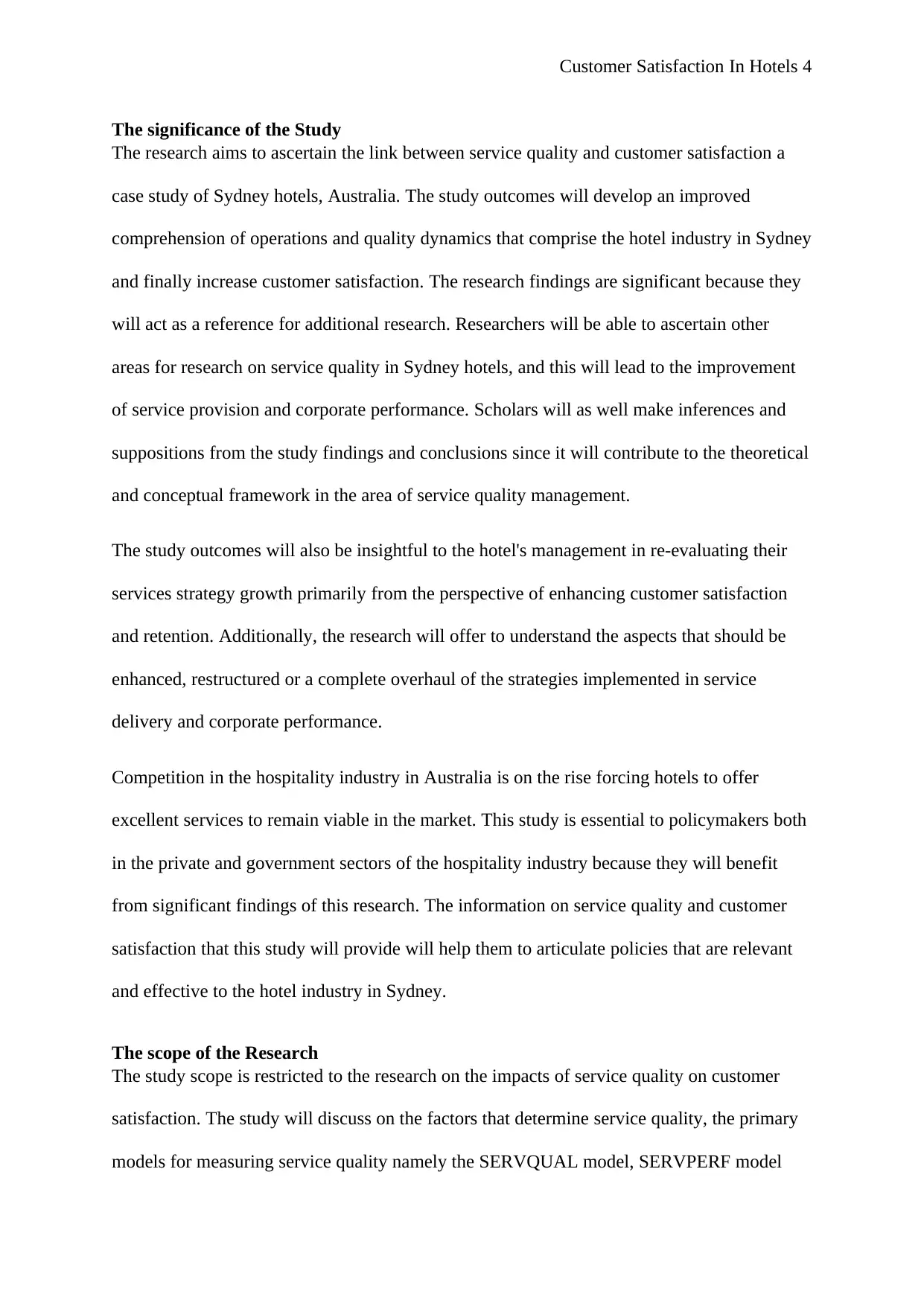
Customer Satisfaction In Hotels 4
The significance of the Study
The research aims to ascertain the link between service quality and customer satisfaction a
case study of Sydney hotels, Australia. The study outcomes will develop an improved
comprehension of operations and quality dynamics that comprise the hotel industry in Sydney
and finally increase customer satisfaction. The research findings are significant because they
will act as a reference for additional research. Researchers will be able to ascertain other
areas for research on service quality in Sydney hotels, and this will lead to the improvement
of service provision and corporate performance. Scholars will as well make inferences and
suppositions from the study findings and conclusions since it will contribute to the theoretical
and conceptual framework in the area of service quality management.
The study outcomes will also be insightful to the hotel's management in re-evaluating their
services strategy growth primarily from the perspective of enhancing customer satisfaction
and retention. Additionally, the research will offer to understand the aspects that should be
enhanced, restructured or a complete overhaul of the strategies implemented in service
delivery and corporate performance.
Competition in the hospitality industry in Australia is on the rise forcing hotels to offer
excellent services to remain viable in the market. This study is essential to policymakers both
in the private and government sectors of the hospitality industry because they will benefit
from significant findings of this research. The information on service quality and customer
satisfaction that this study will provide will help them to articulate policies that are relevant
and effective to the hotel industry in Sydney.
The scope of the Research
The study scope is restricted to the research on the impacts of service quality on customer
satisfaction. The study will discuss on the factors that determine service quality, the primary
models for measuring service quality namely the SERVQUAL model, SERVPERF model
The significance of the Study
The research aims to ascertain the link between service quality and customer satisfaction a
case study of Sydney hotels, Australia. The study outcomes will develop an improved
comprehension of operations and quality dynamics that comprise the hotel industry in Sydney
and finally increase customer satisfaction. The research findings are significant because they
will act as a reference for additional research. Researchers will be able to ascertain other
areas for research on service quality in Sydney hotels, and this will lead to the improvement
of service provision and corporate performance. Scholars will as well make inferences and
suppositions from the study findings and conclusions since it will contribute to the theoretical
and conceptual framework in the area of service quality management.
The study outcomes will also be insightful to the hotel's management in re-evaluating their
services strategy growth primarily from the perspective of enhancing customer satisfaction
and retention. Additionally, the research will offer to understand the aspects that should be
enhanced, restructured or a complete overhaul of the strategies implemented in service
delivery and corporate performance.
Competition in the hospitality industry in Australia is on the rise forcing hotels to offer
excellent services to remain viable in the market. This study is essential to policymakers both
in the private and government sectors of the hospitality industry because they will benefit
from significant findings of this research. The information on service quality and customer
satisfaction that this study will provide will help them to articulate policies that are relevant
and effective to the hotel industry in Sydney.
The scope of the Research
The study scope is restricted to the research on the impacts of service quality on customer
satisfaction. The study will discuss on the factors that determine service quality, the primary
models for measuring service quality namely the SERVQUAL model, SERVPERF model
Paraphrase This Document
Need a fresh take? Get an instant paraphrase of this document with our AI Paraphraser
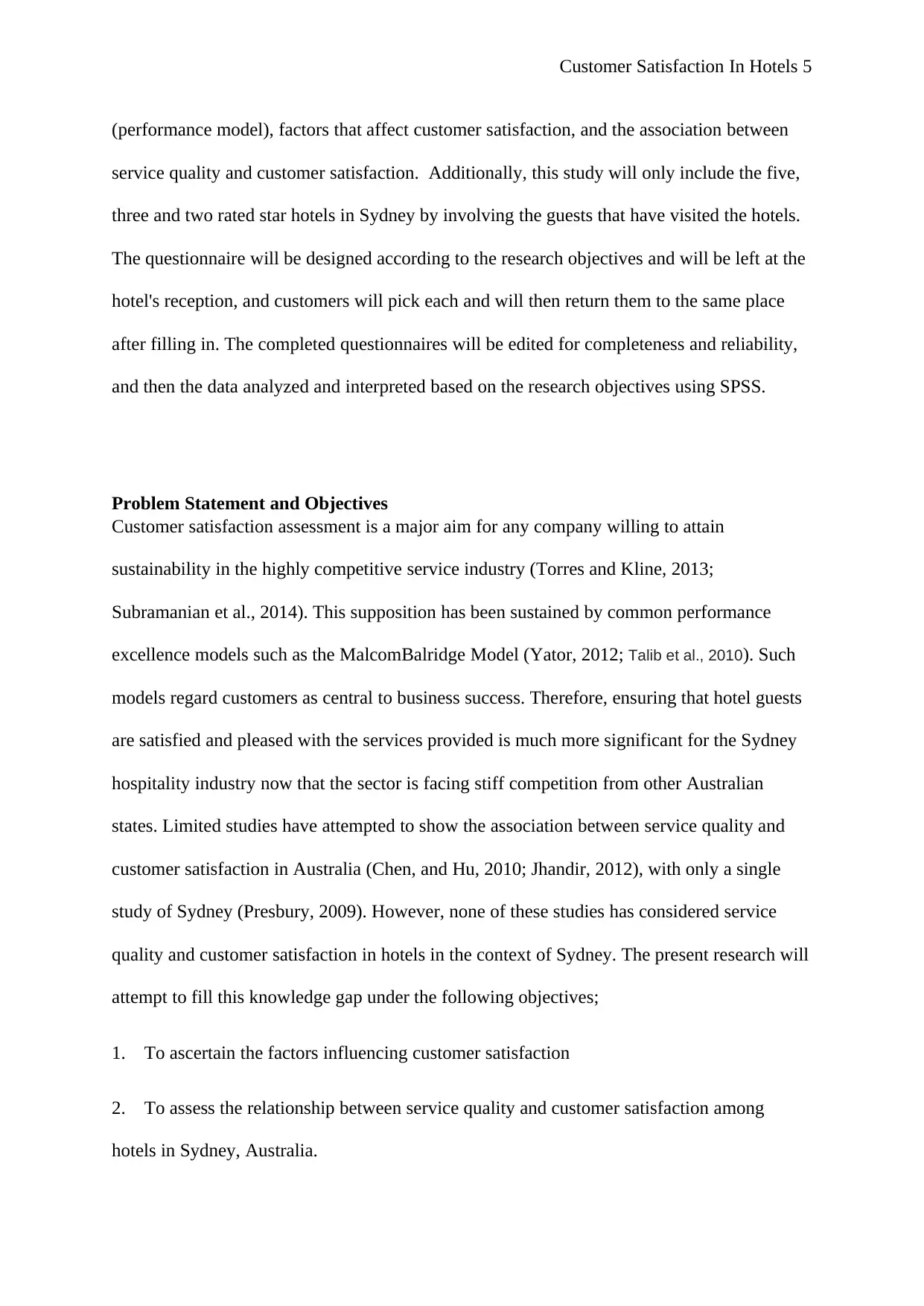
Customer Satisfaction In Hotels 5
(performance model), factors that affect customer satisfaction, and the association between
service quality and customer satisfaction. Additionally, this study will only include the five,
three and two rated star hotels in Sydney by involving the guests that have visited the hotels.
The questionnaire will be designed according to the research objectives and will be left at the
hotel's reception, and customers will pick each and will then return them to the same place
after filling in. The completed questionnaires will be edited for completeness and reliability,
and then the data analyzed and interpreted based on the research objectives using SPSS.
Problem Statement and Objectives
Customer satisfaction assessment is a major aim for any company willing to attain
sustainability in the highly competitive service industry (Torres and Kline, 2013;
Subramanian et al., 2014). This supposition has been sustained by common performance
excellence models such as the MalcomBalridge Model (Yator, 2012; Talib et al., 2010). Such
models regard customers as central to business success. Therefore, ensuring that hotel guests
are satisfied and pleased with the services provided is much more significant for the Sydney
hospitality industry now that the sector is facing stiff competition from other Australian
states. Limited studies have attempted to show the association between service quality and
customer satisfaction in Australia (Chen, and Hu, 2010; Jhandir, 2012), with only a single
study of Sydney (Presbury, 2009). However, none of these studies has considered service
quality and customer satisfaction in hotels in the context of Sydney. The present research will
attempt to fill this knowledge gap under the following objectives;
1. To ascertain the factors influencing customer satisfaction
2. To assess the relationship between service quality and customer satisfaction among
hotels in Sydney, Australia.
(performance model), factors that affect customer satisfaction, and the association between
service quality and customer satisfaction. Additionally, this study will only include the five,
three and two rated star hotels in Sydney by involving the guests that have visited the hotels.
The questionnaire will be designed according to the research objectives and will be left at the
hotel's reception, and customers will pick each and will then return them to the same place
after filling in. The completed questionnaires will be edited for completeness and reliability,
and then the data analyzed and interpreted based on the research objectives using SPSS.
Problem Statement and Objectives
Customer satisfaction assessment is a major aim for any company willing to attain
sustainability in the highly competitive service industry (Torres and Kline, 2013;
Subramanian et al., 2014). This supposition has been sustained by common performance
excellence models such as the MalcomBalridge Model (Yator, 2012; Talib et al., 2010). Such
models regard customers as central to business success. Therefore, ensuring that hotel guests
are satisfied and pleased with the services provided is much more significant for the Sydney
hospitality industry now that the sector is facing stiff competition from other Australian
states. Limited studies have attempted to show the association between service quality and
customer satisfaction in Australia (Chen, and Hu, 2010; Jhandir, 2012), with only a single
study of Sydney (Presbury, 2009). However, none of these studies has considered service
quality and customer satisfaction in hotels in the context of Sydney. The present research will
attempt to fill this knowledge gap under the following objectives;
1. To ascertain the factors influencing customer satisfaction
2. To assess the relationship between service quality and customer satisfaction among
hotels in Sydney, Australia.
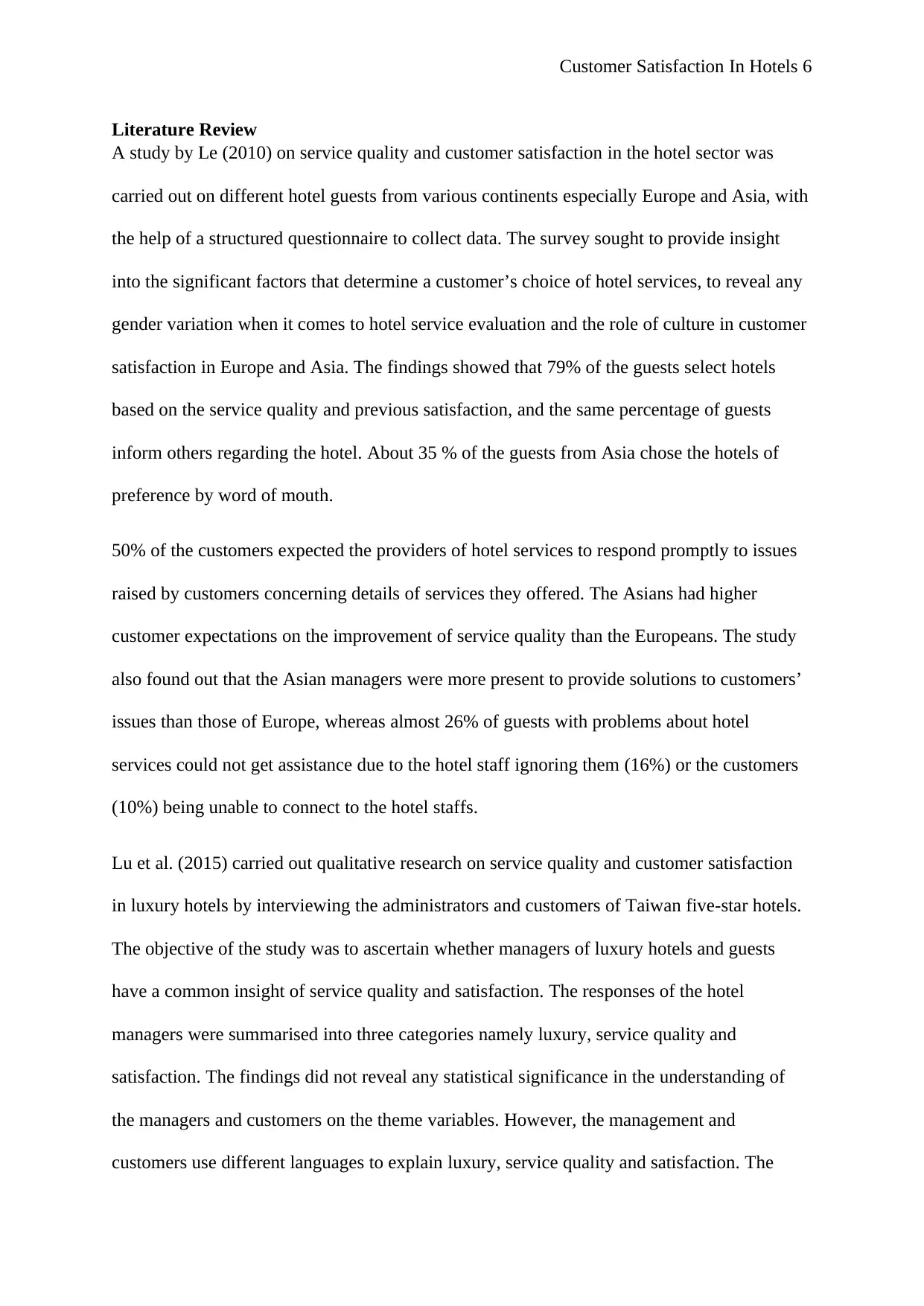
Customer Satisfaction In Hotels 6
Literature Review
A study by Le (2010) on service quality and customer satisfaction in the hotel sector was
carried out on different hotel guests from various continents especially Europe and Asia, with
the help of a structured questionnaire to collect data. The survey sought to provide insight
into the significant factors that determine a customer’s choice of hotel services, to reveal any
gender variation when it comes to hotel service evaluation and the role of culture in customer
satisfaction in Europe and Asia. The findings showed that 79% of the guests select hotels
based on the service quality and previous satisfaction, and the same percentage of guests
inform others regarding the hotel. About 35 % of the guests from Asia chose the hotels of
preference by word of mouth.
50% of the customers expected the providers of hotel services to respond promptly to issues
raised by customers concerning details of services they offered. The Asians had higher
customer expectations on the improvement of service quality than the Europeans. The study
also found out that the Asian managers were more present to provide solutions to customers’
issues than those of Europe, whereas almost 26% of guests with problems about hotel
services could not get assistance due to the hotel staff ignoring them (16%) or the customers
(10%) being unable to connect to the hotel staffs.
Lu et al. (2015) carried out qualitative research on service quality and customer satisfaction
in luxury hotels by interviewing the administrators and customers of Taiwan five-star hotels.
The objective of the study was to ascertain whether managers of luxury hotels and guests
have a common insight of service quality and satisfaction. The responses of the hotel
managers were summarised into three categories namely luxury, service quality and
satisfaction. The findings did not reveal any statistical significance in the understanding of
the managers and customers on the theme variables. However, the management and
customers use different languages to explain luxury, service quality and satisfaction. The
Literature Review
A study by Le (2010) on service quality and customer satisfaction in the hotel sector was
carried out on different hotel guests from various continents especially Europe and Asia, with
the help of a structured questionnaire to collect data. The survey sought to provide insight
into the significant factors that determine a customer’s choice of hotel services, to reveal any
gender variation when it comes to hotel service evaluation and the role of culture in customer
satisfaction in Europe and Asia. The findings showed that 79% of the guests select hotels
based on the service quality and previous satisfaction, and the same percentage of guests
inform others regarding the hotel. About 35 % of the guests from Asia chose the hotels of
preference by word of mouth.
50% of the customers expected the providers of hotel services to respond promptly to issues
raised by customers concerning details of services they offered. The Asians had higher
customer expectations on the improvement of service quality than the Europeans. The study
also found out that the Asian managers were more present to provide solutions to customers’
issues than those of Europe, whereas almost 26% of guests with problems about hotel
services could not get assistance due to the hotel staff ignoring them (16%) or the customers
(10%) being unable to connect to the hotel staffs.
Lu et al. (2015) carried out qualitative research on service quality and customer satisfaction
in luxury hotels by interviewing the administrators and customers of Taiwan five-star hotels.
The objective of the study was to ascertain whether managers of luxury hotels and guests
have a common insight of service quality and satisfaction. The responses of the hotel
managers were summarised into three categories namely luxury, service quality and
satisfaction. The findings did not reveal any statistical significance in the understanding of
the managers and customers on the theme variables. However, the management and
customers use different languages to explain luxury, service quality and satisfaction. The
⊘ This is a preview!⊘
Do you want full access?
Subscribe today to unlock all pages.

Trusted by 1+ million students worldwide
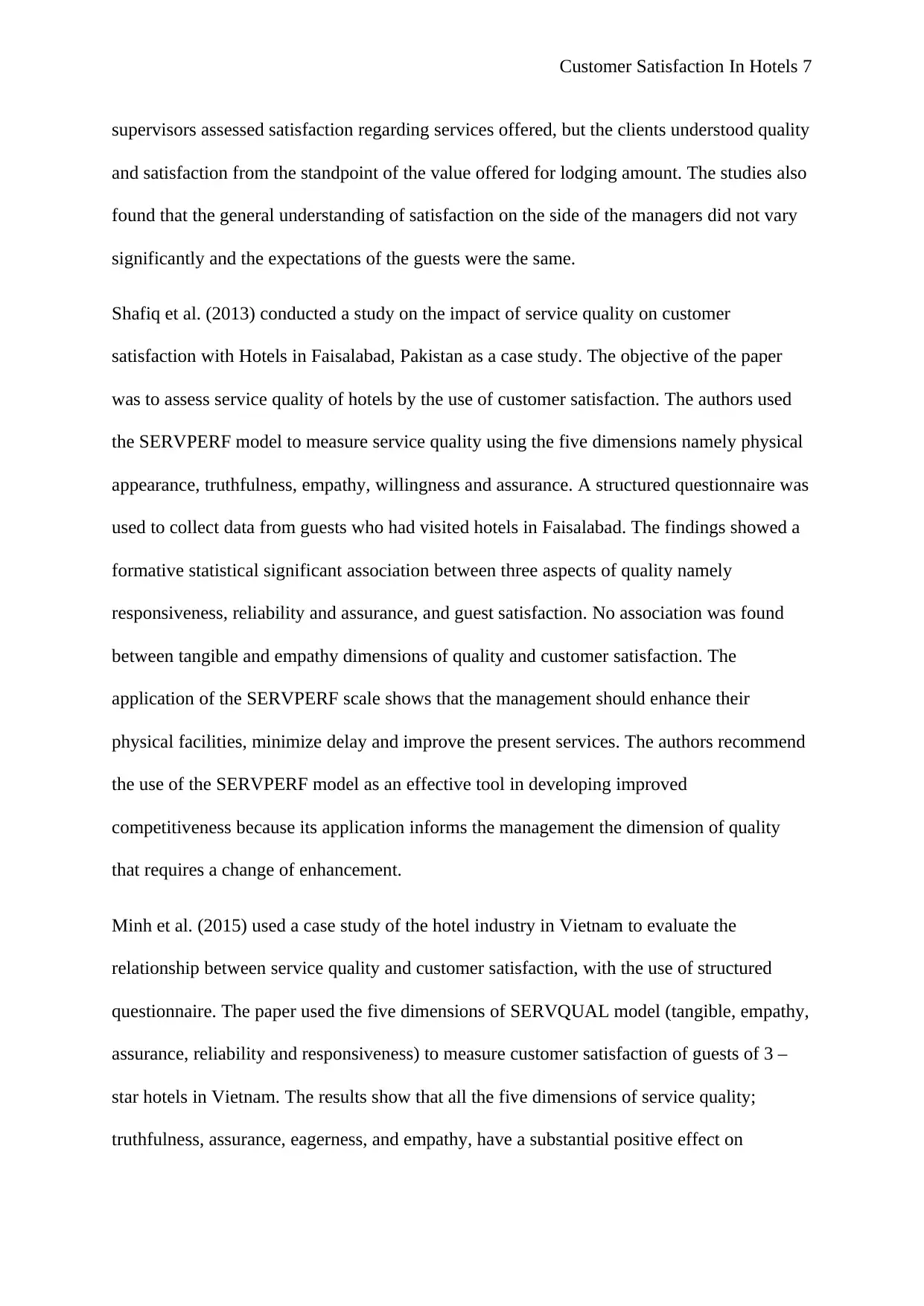
Customer Satisfaction In Hotels 7
supervisors assessed satisfaction regarding services offered, but the clients understood quality
and satisfaction from the standpoint of the value offered for lodging amount. The studies also
found that the general understanding of satisfaction on the side of the managers did not vary
significantly and the expectations of the guests were the same.
Shafiq et al. (2013) conducted a study on the impact of service quality on customer
satisfaction with Hotels in Faisalabad, Pakistan as a case study. The objective of the paper
was to assess service quality of hotels by the use of customer satisfaction. The authors used
the SERVPERF model to measure service quality using the five dimensions namely physical
appearance, truthfulness, empathy, willingness and assurance. A structured questionnaire was
used to collect data from guests who had visited hotels in Faisalabad. The findings showed a
formative statistical significant association between three aspects of quality namely
responsiveness, reliability and assurance, and guest satisfaction. No association was found
between tangible and empathy dimensions of quality and customer satisfaction. The
application of the SERVPERF scale shows that the management should enhance their
physical facilities, minimize delay and improve the present services. The authors recommend
the use of the SERVPERF model as an effective tool in developing improved
competitiveness because its application informs the management the dimension of quality
that requires a change of enhancement.
Minh et al. (2015) used a case study of the hotel industry in Vietnam to evaluate the
relationship between service quality and customer satisfaction, with the use of structured
questionnaire. The paper used the five dimensions of SERVQUAL model (tangible, empathy,
assurance, reliability and responsiveness) to measure customer satisfaction of guests of 3 –
star hotels in Vietnam. The results show that all the five dimensions of service quality;
truthfulness, assurance, eagerness, and empathy, have a substantial positive effect on
supervisors assessed satisfaction regarding services offered, but the clients understood quality
and satisfaction from the standpoint of the value offered for lodging amount. The studies also
found that the general understanding of satisfaction on the side of the managers did not vary
significantly and the expectations of the guests were the same.
Shafiq et al. (2013) conducted a study on the impact of service quality on customer
satisfaction with Hotels in Faisalabad, Pakistan as a case study. The objective of the paper
was to assess service quality of hotels by the use of customer satisfaction. The authors used
the SERVPERF model to measure service quality using the five dimensions namely physical
appearance, truthfulness, empathy, willingness and assurance. A structured questionnaire was
used to collect data from guests who had visited hotels in Faisalabad. The findings showed a
formative statistical significant association between three aspects of quality namely
responsiveness, reliability and assurance, and guest satisfaction. No association was found
between tangible and empathy dimensions of quality and customer satisfaction. The
application of the SERVPERF scale shows that the management should enhance their
physical facilities, minimize delay and improve the present services. The authors recommend
the use of the SERVPERF model as an effective tool in developing improved
competitiveness because its application informs the management the dimension of quality
that requires a change of enhancement.
Minh et al. (2015) used a case study of the hotel industry in Vietnam to evaluate the
relationship between service quality and customer satisfaction, with the use of structured
questionnaire. The paper used the five dimensions of SERVQUAL model (tangible, empathy,
assurance, reliability and responsiveness) to measure customer satisfaction of guests of 3 –
star hotels in Vietnam. The results show that all the five dimensions of service quality;
truthfulness, assurance, eagerness, and empathy, have a substantial positive effect on
Paraphrase This Document
Need a fresh take? Get an instant paraphrase of this document with our AI Paraphraser
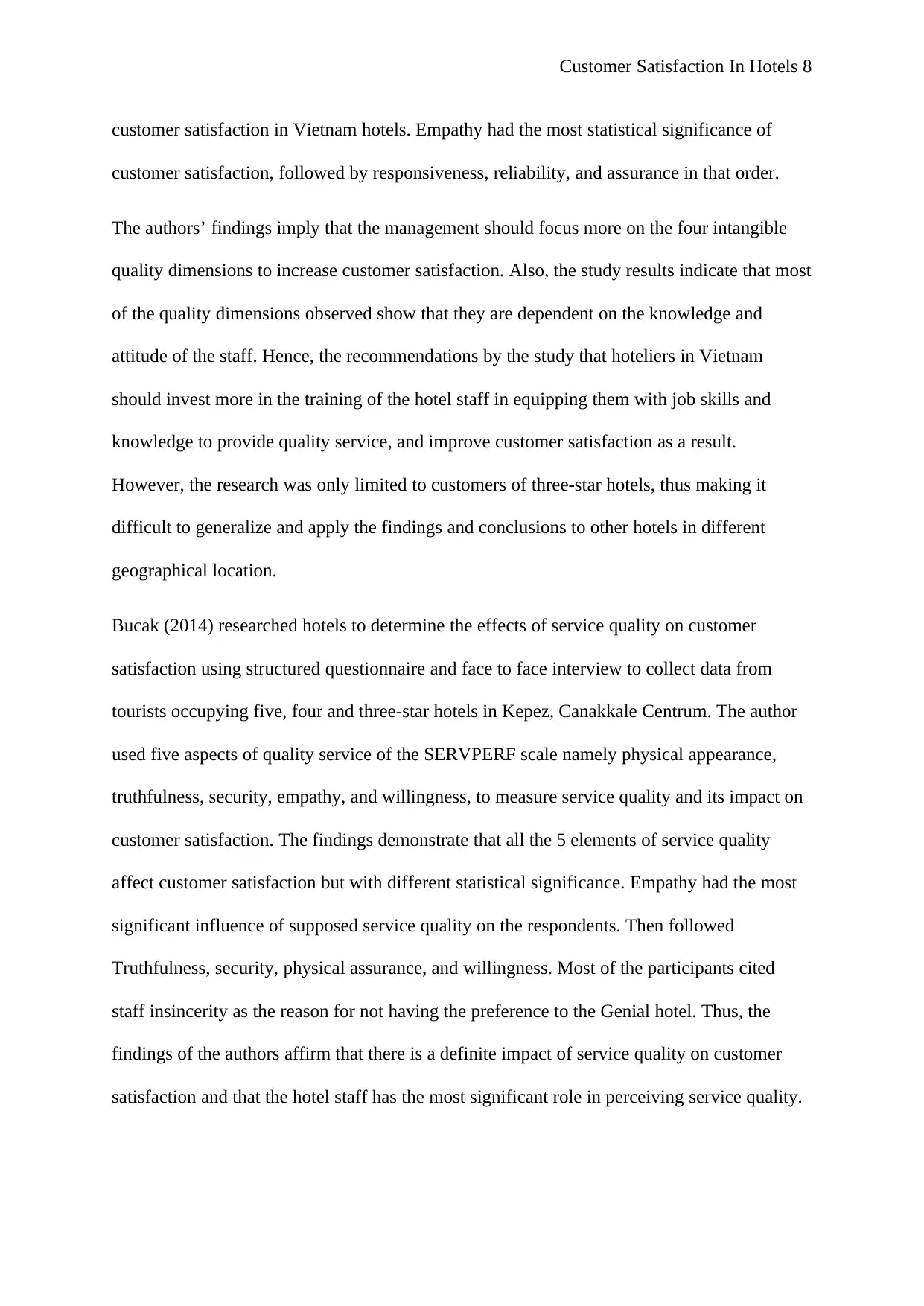
Customer Satisfaction In Hotels 8
customer satisfaction in Vietnam hotels. Empathy had the most statistical significance of
customer satisfaction, followed by responsiveness, reliability, and assurance in that order.
The authors’ findings imply that the management should focus more on the four intangible
quality dimensions to increase customer satisfaction. Also, the study results indicate that most
of the quality dimensions observed show that they are dependent on the knowledge and
attitude of the staff. Hence, the recommendations by the study that hoteliers in Vietnam
should invest more in the training of the hotel staff in equipping them with job skills and
knowledge to provide quality service, and improve customer satisfaction as a result.
However, the research was only limited to customers of three-star hotels, thus making it
difficult to generalize and apply the findings and conclusions to other hotels in different
geographical location.
Bucak (2014) researched hotels to determine the effects of service quality on customer
satisfaction using structured questionnaire and face to face interview to collect data from
tourists occupying five, four and three-star hotels in Kepez, Canakkale Centrum. The author
used five aspects of quality service of the SERVPERF scale namely physical appearance,
truthfulness, security, empathy, and willingness, to measure service quality and its impact on
customer satisfaction. The findings demonstrate that all the 5 elements of service quality
affect customer satisfaction but with different statistical significance. Empathy had the most
significant influence of supposed service quality on the respondents. Then followed
Truthfulness, security, physical assurance, and willingness. Most of the participants cited
staff insincerity as the reason for not having the preference to the Genial hotel. Thus, the
findings of the authors affirm that there is a definite impact of service quality on customer
satisfaction and that the hotel staff has the most significant role in perceiving service quality.
customer satisfaction in Vietnam hotels. Empathy had the most statistical significance of
customer satisfaction, followed by responsiveness, reliability, and assurance in that order.
The authors’ findings imply that the management should focus more on the four intangible
quality dimensions to increase customer satisfaction. Also, the study results indicate that most
of the quality dimensions observed show that they are dependent on the knowledge and
attitude of the staff. Hence, the recommendations by the study that hoteliers in Vietnam
should invest more in the training of the hotel staff in equipping them with job skills and
knowledge to provide quality service, and improve customer satisfaction as a result.
However, the research was only limited to customers of three-star hotels, thus making it
difficult to generalize and apply the findings and conclusions to other hotels in different
geographical location.
Bucak (2014) researched hotels to determine the effects of service quality on customer
satisfaction using structured questionnaire and face to face interview to collect data from
tourists occupying five, four and three-star hotels in Kepez, Canakkale Centrum. The author
used five aspects of quality service of the SERVPERF scale namely physical appearance,
truthfulness, security, empathy, and willingness, to measure service quality and its impact on
customer satisfaction. The findings demonstrate that all the 5 elements of service quality
affect customer satisfaction but with different statistical significance. Empathy had the most
significant influence of supposed service quality on the respondents. Then followed
Truthfulness, security, physical assurance, and willingness. Most of the participants cited
staff insincerity as the reason for not having the preference to the Genial hotel. Thus, the
findings of the authors affirm that there is a definite impact of service quality on customer
satisfaction and that the hotel staff has the most significant role in perceiving service quality.
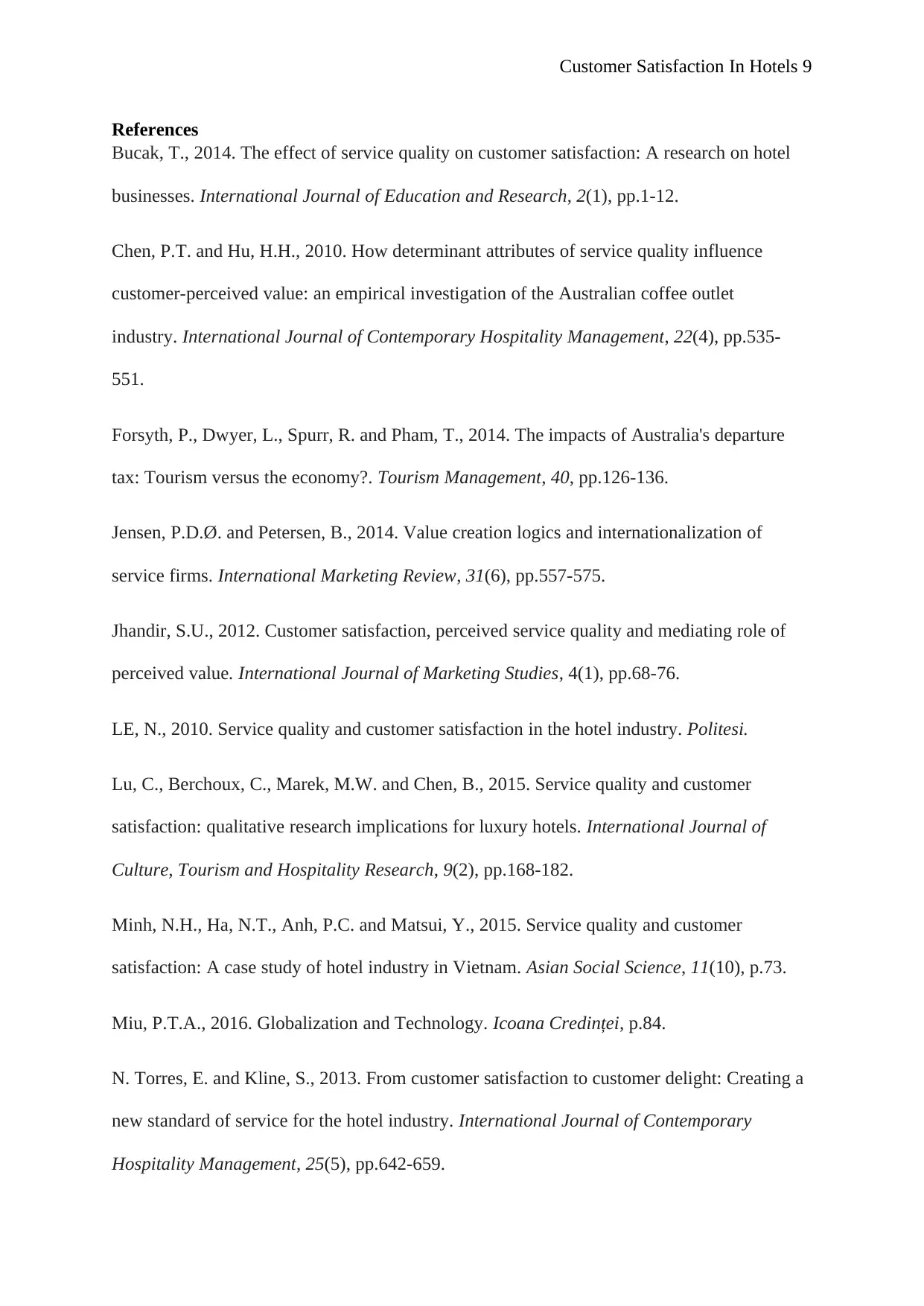
Customer Satisfaction In Hotels 9
References
Bucak, T., 2014. The effect of service quality on customer satisfaction: A research on hotel
businesses. International Journal of Education and Research, 2(1), pp.1-12.
Chen, P.T. and Hu, H.H., 2010. How determinant attributes of service quality influence
customer-perceived value: an empirical investigation of the Australian coffee outlet
industry. International Journal of Contemporary Hospitality Management, 22(4), pp.535-
551.
Forsyth, P., Dwyer, L., Spurr, R. and Pham, T., 2014. The impacts of Australia's departure
tax: Tourism versus the economy?. Tourism Management, 40, pp.126-136.
Jensen, P.D.Ø. and Petersen, B., 2014. Value creation logics and internationalization of
service firms. International Marketing Review, 31(6), pp.557-575.
Jhandir, S.U., 2012. Customer satisfaction, perceived service quality and mediating role of
perceived value. International Journal of Marketing Studies, 4(1), pp.68-76.
LE, N., 2010. Service quality and customer satisfaction in the hotel industry. Politesi.
Lu, C., Berchoux, C., Marek, M.W. and Chen, B., 2015. Service quality and customer
satisfaction: qualitative research implications for luxury hotels. International Journal of
Culture, Tourism and Hospitality Research, 9(2), pp.168-182.
Minh, N.H., Ha, N.T., Anh, P.C. and Matsui, Y., 2015. Service quality and customer
satisfaction: A case study of hotel industry in Vietnam. Asian Social Science, 11(10), p.73.
Miu, P.T.A., 2016. Globalization and Technology. Icoana Credinței, p.84.
N. Torres, E. and Kline, S., 2013. From customer satisfaction to customer delight: Creating a
new standard of service for the hotel industry. International Journal of Contemporary
Hospitality Management, 25(5), pp.642-659.
References
Bucak, T., 2014. The effect of service quality on customer satisfaction: A research on hotel
businesses. International Journal of Education and Research, 2(1), pp.1-12.
Chen, P.T. and Hu, H.H., 2010. How determinant attributes of service quality influence
customer-perceived value: an empirical investigation of the Australian coffee outlet
industry. International Journal of Contemporary Hospitality Management, 22(4), pp.535-
551.
Forsyth, P., Dwyer, L., Spurr, R. and Pham, T., 2014. The impacts of Australia's departure
tax: Tourism versus the economy?. Tourism Management, 40, pp.126-136.
Jensen, P.D.Ø. and Petersen, B., 2014. Value creation logics and internationalization of
service firms. International Marketing Review, 31(6), pp.557-575.
Jhandir, S.U., 2012. Customer satisfaction, perceived service quality and mediating role of
perceived value. International Journal of Marketing Studies, 4(1), pp.68-76.
LE, N., 2010. Service quality and customer satisfaction in the hotel industry. Politesi.
Lu, C., Berchoux, C., Marek, M.W. and Chen, B., 2015. Service quality and customer
satisfaction: qualitative research implications for luxury hotels. International Journal of
Culture, Tourism and Hospitality Research, 9(2), pp.168-182.
Minh, N.H., Ha, N.T., Anh, P.C. and Matsui, Y., 2015. Service quality and customer
satisfaction: A case study of hotel industry in Vietnam. Asian Social Science, 11(10), p.73.
Miu, P.T.A., 2016. Globalization and Technology. Icoana Credinței, p.84.
N. Torres, E. and Kline, S., 2013. From customer satisfaction to customer delight: Creating a
new standard of service for the hotel industry. International Journal of Contemporary
Hospitality Management, 25(5), pp.642-659.
⊘ This is a preview!⊘
Do you want full access?
Subscribe today to unlock all pages.

Trusted by 1+ million students worldwide
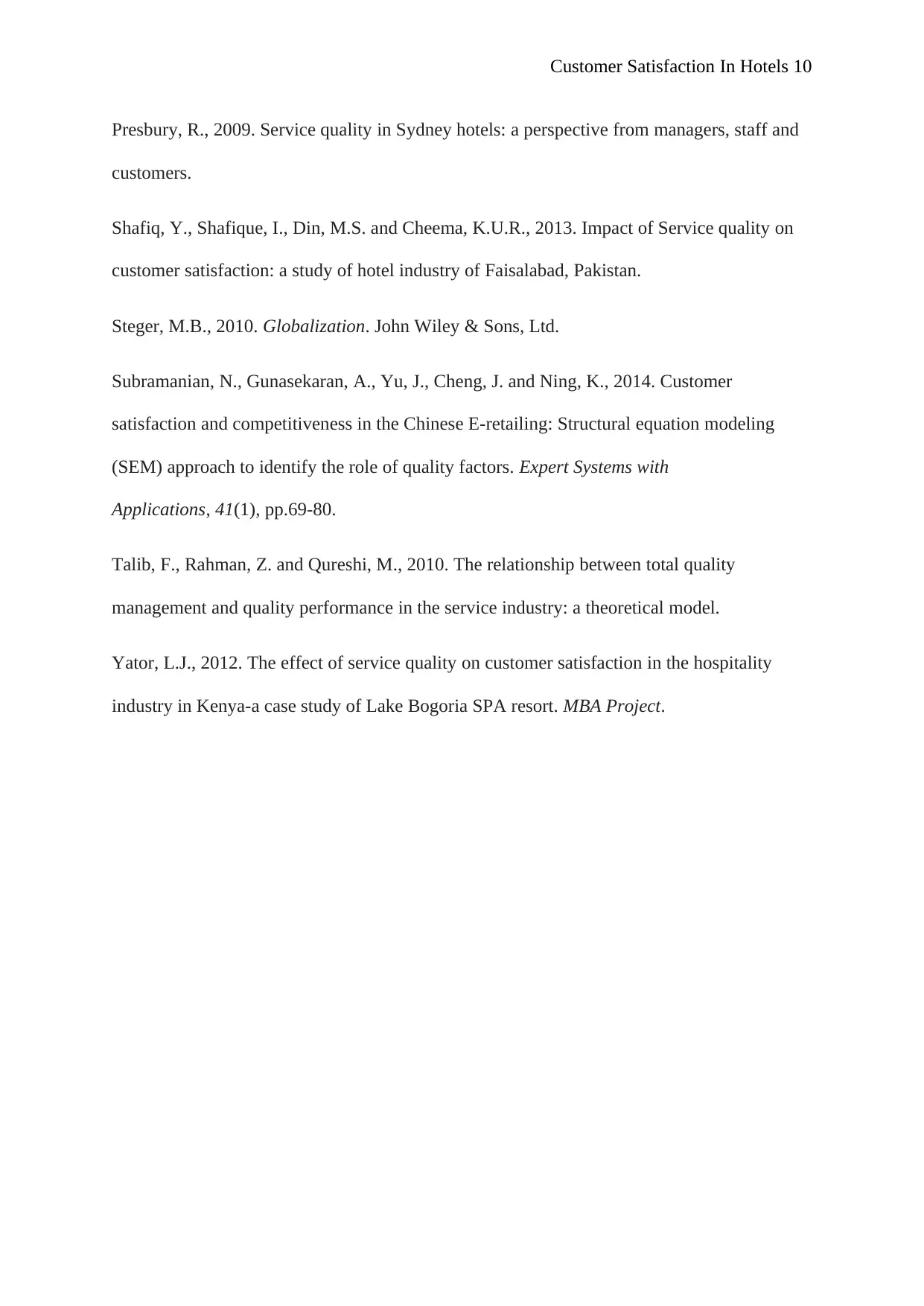
Customer Satisfaction In Hotels 10
Presbury, R., 2009. Service quality in Sydney hotels: a perspective from managers, staff and
customers.
Shafiq, Y., Shafique, I., Din, M.S. and Cheema, K.U.R., 2013. Impact of Service quality on
customer satisfaction: a study of hotel industry of Faisalabad, Pakistan.
Steger, M.B., 2010. Globalization. John Wiley & Sons, Ltd.
Subramanian, N., Gunasekaran, A., Yu, J., Cheng, J. and Ning, K., 2014. Customer
satisfaction and competitiveness in the Chinese E-retailing: Structural equation modeling
(SEM) approach to identify the role of quality factors. Expert Systems with
Applications, 41(1), pp.69-80.
Talib, F., Rahman, Z. and Qureshi, M., 2010. The relationship between total quality
management and quality performance in the service industry: a theoretical model.
Yator, L.J., 2012. The effect of service quality on customer satisfaction in the hospitality
industry in Kenya-a case study of Lake Bogoria SPA resort. MBA Project.
Presbury, R., 2009. Service quality in Sydney hotels: a perspective from managers, staff and
customers.
Shafiq, Y., Shafique, I., Din, M.S. and Cheema, K.U.R., 2013. Impact of Service quality on
customer satisfaction: a study of hotel industry of Faisalabad, Pakistan.
Steger, M.B., 2010. Globalization. John Wiley & Sons, Ltd.
Subramanian, N., Gunasekaran, A., Yu, J., Cheng, J. and Ning, K., 2014. Customer
satisfaction and competitiveness in the Chinese E-retailing: Structural equation modeling
(SEM) approach to identify the role of quality factors. Expert Systems with
Applications, 41(1), pp.69-80.
Talib, F., Rahman, Z. and Qureshi, M., 2010. The relationship between total quality
management and quality performance in the service industry: a theoretical model.
Yator, L.J., 2012. The effect of service quality on customer satisfaction in the hospitality
industry in Kenya-a case study of Lake Bogoria SPA resort. MBA Project.
1 out of 10
Related Documents
Your All-in-One AI-Powered Toolkit for Academic Success.
+13062052269
info@desklib.com
Available 24*7 on WhatsApp / Email
![[object Object]](/_next/static/media/star-bottom.7253800d.svg)
Unlock your academic potential
Copyright © 2020–2026 A2Z Services. All Rights Reserved. Developed and managed by ZUCOL.





